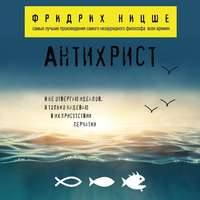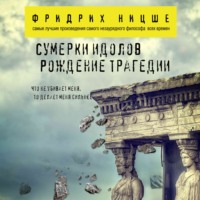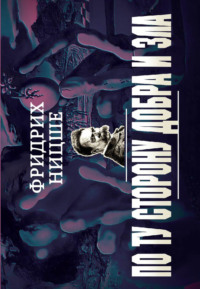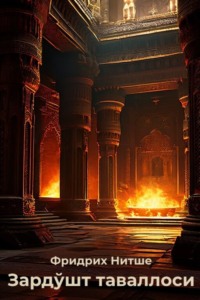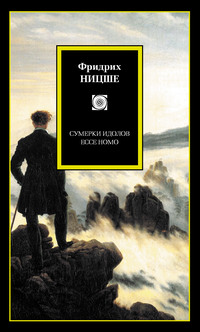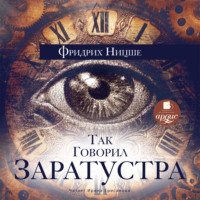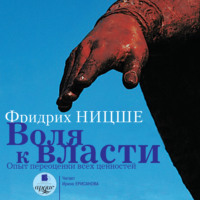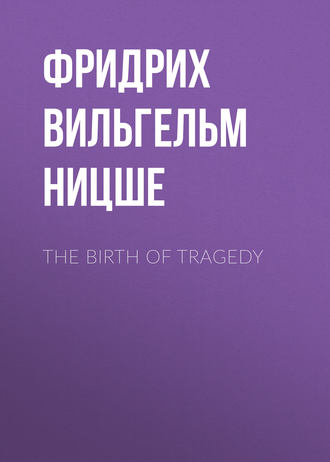 полная версия
полная версияThe Birth of Tragedy
How is the Olympian world of deities related to this folk-wisdom? Even as the rapturous vision of the tortured martyr to his sufferings.
Now the Olympian magic mountain opens, as it were, to our view and shows to us its roots. The Greek knew and felt the terrors and horrors of existence: to be able to live at all, he had to interpose the shining dream-birth of the Olympian world between himself and them. The excessive distrust of the titanic powers of nature, the Moira throning inexorably over all knowledge, the vulture of the great philanthropist Prometheus, the terrible fate of the wise Œdipus, the family curse of the Atridæ which drove Orestes to matricide; in short, that entire philosophy of the sylvan god, with its mythical exemplars, which wrought the ruin of the melancholy Etruscans – was again and again surmounted anew by the Greeks through the artistic middle world of the Olympians, or at least veiled and withdrawn from sight. To be able to live, the Greeks had, from direst necessity, to create these gods: which process we may perhaps picture to ourselves in this manner: that out of the original Titan thearchy of terror the Olympian thearchy of joy was evolved, by slow transitions, through the Apollonian impulse to beauty, even as roses break forth from thorny bushes. How else could this so sensitive people, so vehement in its desires, so singularly qualified for sufferings have endured existence, if it had not been exhibited to them in their gods, surrounded with a higher glory? The same impulse which calls art into being, as the complement and consummation of existence, seducing to a continuation of life, caused also the Olympian world to arise, in which the Hellenic "will" held up before itself a transfiguring mirror. Thus do the gods justify the life of man, in that they themselves live it – the only satisfactory Theodicy! Existence under the bright sunshine of such gods is regarded as that which is desirable in itself, and the real grief of the Homeric men has reference to parting from it, especially to early parting: so that we might now say of them, with a reversion of the Silenian wisdom, that "to die early is worst of all for them, the second worst is – some day to die at all." If once the lamentation is heard, it will ring out again, of the short-lived Achilles, of the leaf-like change and vicissitude of the human race, of the decay of the heroic age. It is not unworthy of the greatest hero to long for a continuation of life, ay, even as a day-labourer. So vehemently does the "will," at the Apollonian stage of development, long for this existence, so completely at one does the Homeric man feel himself with it, that the very lamentation becomes its song of praise.
Here we must observe that this harmony which is so eagerly contemplated by modern man, in fact, this oneness of man with nature, to express which Schiller introduced the technical term "naïve," is by no means such a simple, naturally resulting and, as it were, inevitable condition, which must be found at the gate of every culture leading to a paradise of man: this could be believed only by an age which sought to picture to itself Rousseau's Émile also as an artist, and imagined it had found in Homer such an artist Émile, reared at Nature's bosom. Wherever we meet with the "naïve" in art, it behoves us to recognise the highest effect of the Apollonian culture, which in the first place has always to overthrow some Titanic empire and slay monsters, and which, through powerful dazzling representations and pleasurable illusions, must have triumphed over a terrible depth of world-contemplation and a most keen susceptibility to suffering. But how seldom is the naïve – that complete absorption, in the beauty of appearance – attained! And hence how inexpressibly sublime is Homer, who, as unit being, bears the same relation to this Apollonian folk-culture as the unit dream-artist does to the dream-faculty of the people and of Nature in general. The Homeric "naïveté" can be comprehended only as the complete triumph of the Apollonian illusion: it is the same kind of illusion as Nature so frequently employs to compass her ends. The true goal is veiled by a phantasm: we stretch out our hands for the latter, while Nature attains the former through our illusion. In the Greeks the "will" desired to contemplate itself in the transfiguration of the genius and the world of art; in order to glorify themselves, its creatures had to feel themselves worthy of glory; they had to behold themselves again in a higher sphere, without this consummate world of contemplation acting as an imperative or reproach. Such is the sphere of beauty, in which, as in a mirror, they saw their images, the Olympians. With this mirroring of beauty the Hellenic will combated its talent – correlative to the artistic – for suffering and for the wisdom of suffering: and, as a monument of its victory, Homer, the naïve artist, stands before us.
4Concerning this naïve artist the analogy of dreams will enlighten us to some extent. When we realise to ourselves the dreamer, as, in the midst of the illusion of the dream-world and without disturbing it, he calls out to himself: "it is a dream, I will dream on"; when we must thence infer a deep inner joy in dream-contemplation; when, on the other hand, to be at all able to dream with this inner joy in contemplation, we must have completely forgotten the day and its terrible obtrusiveness, we may, under the direction of the dream-reading Apollo, interpret all these phenomena to ourselves somewhat as follows. Though it is certain that of the two halves of life, the waking and the dreaming, the former appeals to us as by far the more preferred, important, excellent and worthy of being lived, indeed, as that which alone is lived: yet, with reference to that mysterious ground of our being of which we are the phenomenon, I should, paradoxical as it may seem, be inclined to maintain the very opposite estimate of the value of dream life. For the more clearly I perceive in nature those all-powerful art impulses, and in them a fervent longing for appearance, for redemption through appearance, the more I feel myself driven to the metaphysical assumption that the Verily-Existent and Primordial Unity, as the Eternally Suffering and Self-Contradictory, requires the rapturous vision, the joyful appearance, for its continuous salvation: which appearance we, who are completely wrapt in it and composed of it, must regard as the Verily Non-existent, – i. e., as a perpetual unfolding in time, space and causality, – in other words, as empiric reality. If we therefore waive the consideration of our own "reality" for the present, if we conceive our empiric existence, and that of the world generally, as a representation of the Primordial Unity generated every moment, we shall then have to regard the dream as an appearance of appearance, hence as a still higher gratification of the primordial desire for appearance. It is for this same reason that the innermost heart of Nature experiences that indescribable joy in the naïve artist and in the naïve work of art, which is likewise only "an appearance of appearance." In a symbolic painting, Raphael, himself one of these immortal "naïve" ones, has represented to us this depotentiating of appearance to appearance, the primordial process of the naïve artist and at the same time of Apollonian culture. In his Transfiguration, the lower half, with the possessed boy, the despairing bearers, the helpless, terrified disciples, shows to us the reflection of eternal primordial pain, the sole basis of the world: the "appearance" here is the counter-appearance of eternal Contradiction, the father of things. Out of this appearance then arises, like an ambrosial vapour, a visionlike new world of appearances, of which those wrapt in the first appearance see nothing – a radiant floating in purest bliss and painless Contemplation beaming from wide-open eyes. Here there is presented to our view, in the highest symbolism of art, that Apollonian world of beauty and its substratum, the terrible wisdom of Silenus, and we comprehend, by intuition, their necessary interdependence. Apollo, however, again appears to us as the apotheosis of the principium individuationis, in which alone the perpetually attained end of the Primordial Unity, its redemption through appearance, is consummated: he shows us, with sublime attitudes, how the entire world of torment is necessary, that thereby the individual may be impelled to realise the redeeming vision, and then, sunk in contemplation thereof, quietly sit in his fluctuating barque, in the midst of the sea.
This apotheosis of individuation, if it be at all conceived as imperative and laying down precepts, knows but one law – the individual, i. e., the observance of the boundaries of the individual, measure in the Hellenic sense. Apollo, as ethical deity, demands due proportion of his disciples, and, that this may be observed, he demands self-knowledge. And thus, parallel to the æsthetic necessity for beauty, there run the demands "know thyself" and "not too much," while presumption and undueness are regarded as the truly hostile demons of the non-Apollonian sphere, hence as characteristics of the pre-Apollonian age, that of the Titans, and of the extra-Apollonian world, that of the barbarians. Because of his Titan-like love for man, Prometheus had to be torn to pieces by vultures; because of his excessive wisdom, which solved the riddle of the Sphinx, Œdipus had to plunge into a bewildering vortex of monstrous crimes: thus did the Delphic god interpret the Grecian past.
So also the effects wrought by the Dionysian appeared "titanic" and "barbaric" to the Apollonian Greek: while at the same time he could not conceal from himself that he too was inwardly related to these overthrown Titans and heroes. Indeed, he had to recognise still more than this: his entire existence, with all its beauty and moderation, rested on a hidden substratum of suffering and of knowledge, which was again disclosed to him by the Dionysian. And lo! Apollo could not live without Dionysus! The "titanic" and the "barbaric" were in the end not less necessary than the Apollonian. And now let us imagine to ourselves how the ecstatic tone of the Dionysian festival sounded in ever more luring and bewitching strains into this artificially confined world built on appearance and moderation, how in these strains all the undueness of nature, in joy, sorrow, and knowledge, even to the transpiercing shriek, became audible: let us ask ourselves what meaning could be attached to the psalmodising artist of Apollo, with the phantom harp-sound, as compared with this demonic folk-song! The muses of the arts of "appearance" paled before an art which, in its intoxication, spoke the truth, the wisdom of Silenus cried "woe! woe!" against the cheerful Olympians. The individual, with all his boundaries and due proportions, went under in the self-oblivion of the Dionysian states and forgot the Apollonian precepts. The Undueness revealed itself as truth, contradiction, the bliss born of pain, declared itself but of the heart of nature. And thus, wherever the Dionysian prevailed, the Apollonian was routed and annihilated. But it is quite as certain that, where the first assault was successfully withstood, the authority and majesty of the Delphic god exhibited itself as more rigid and menacing than ever. For I can only explain to myself the Doric state and Doric art as a permanent war-camp of the Apollonian: only by incessant opposition to the titanic-barbaric nature of the Dionysian was it possible for an art so defiantly-prim, so encompassed with bulwarks, a training so warlike and rigorous, a constitution so cruel and relentless, to last for any length of time.
Up to this point we have enlarged upon the observation made at the beginning of this essay: how the Dionysian and the Apollonian, in ever new births succeeding and mutually augmenting one another, controlled the Hellenic genius: how from out the age of "bronze," with its Titan struggles and rigorous folk-philosophy, the Homeric world develops under the fostering sway of the Apollonian impulse to beauty, how this "naïve" splendour is again overwhelmed by the inbursting flood of the Dionysian, and how against this new power the Apollonian rises to the austere majesty of Doric art and the Doric view of things. If, then, in this way, in the strife of these two hostile principles, the older Hellenic history falls into four great periods of art, we are now driven to inquire after the ulterior purpose of these unfoldings and processes, unless perchance we should regard the last-attained period, the period of Doric art, as the end and aim of these artistic impulses: and here the sublime and highly celebrated art-work of Attic tragedy and dramatic dithyramb presents itself to our view as the common goal of both these impulses, whose mysterious union, after many and long precursory struggles, found its glorious consummation in such a child, – which is at once Antigone and Cassandra.
5We now approach the real purpose of our investigation, which aims at acquiring a knowledge of the Dionyso-Apollonian genius and his art-work, or at least an anticipatory understanding of the mystery of the aforesaid union. Here we shall ask first of all where that new germ which subsequently developed into tragedy and dramatic dithyramb first makes itself perceptible in the Hellenic world. The ancients themselves supply the answer in symbolic form, when they place Homer and Archilochus as the forefathers and torch-bearers of Greek poetry side by side on gems, sculptures, etc., in the sure conviction that only these two thoroughly original compeers, from whom a stream of fire flows over the whole of Greek posterity, should be taken into consideration. Homer, the aged dreamer sunk in himself, the type of the Apollonian naïve artist, beholds now with astonishment the impassioned genius of the warlike votary of the muses, Archilochus, violently tossed to and fro on the billows of existence: and modern æsthetics could only add by way of interpretation, that here the "objective" artist is confronted by the first "subjective" artist. But this interpretation is of little service to us, because we know the subjective artist only as the poor artist, and in every type and elevation of art we demand specially and first of all the conquest of the Subjective, the redemption from the "ego" and the cessation of every individual will and desire; indeed, we find it impossible to believe in any truly artistic production, however insignificant, without objectivity, without pure, interestless contemplation. Hence our æsthetics must first solve the problem as to how the "lyrist" is possible as an artist: he who according to the experience of all ages continually says "I" and sings off to us the entire chromatic scale of his passions and desires. This very Archilochus appals us, alongside of Homer, by his cries of hatred and scorn, by the drunken outbursts of his desire. Is not just he then, who has been called the first subjective artist, the non-artist proper? But whence then the reverence which was shown to him – the poet – in very remarkable utterances by the Delphic oracle itself, the focus of "objective" art?
Schiller has enlightened us concerning his poetic procedure by a psychological observation, inexplicable to himself, yet not apparently open to any objection. He acknowledges that as the preparatory state to the act of poetising he had not perhaps before him or within him a series of pictures with co-ordinate causality of thoughts, but rather a musical mood ("The perception with me is at first without a clear and definite object; this forms itself later. A certain musical mood of mind precedes, and only after this does the poetical idea follow with me.") Add to this the most important phenomenon of all ancient lyric poetry, the union, regarded everywhere as natural, of the lyrist with the musician, their very identity, indeed, – compared with which our modern lyric poetry is like the statue of a god without a head, – and we may now, on the basis of our metaphysics of æsthetics set forth above, interpret the lyrist to ourselves as follows. As Dionysian artist he is in the first place become altogether one with the Primordial Unity, its pain and contradiction, and he produces the copy of this Primordial Unity as music, granting that music has been correctly termed a repetition and a recast of the world; but now, under the Apollonian dream-inspiration, this music again becomes visible to him as in a symbolic dream-picture. The formless and intangible reflection of the primordial pain in music, with its redemption in appearance, then generates a second mirroring as a concrete symbol or example. The artist has already surrendered his subjectivity in the Dionysian process: the picture which now shows to him his oneness with the heart of the world, is a dream-scene, which embodies the primordial contradiction and primordial pain, together with the primordial joy, of appearance. The "I" of the lyrist sounds therefore from the abyss of being: its "subjectivity," in the sense of the modern æsthetes, is a fiction. When Archilochus, the first lyrist of the Greeks, makes known both his mad love and his contempt to the daughters of Lycambes, it is not his passion which dances before us in orgiastic frenzy: we see Dionysus and the Mænads, we see the drunken reveller Archilochus sunk down to sleep – as Euripides depicts it in the Bacchæ, the sleep on the high Alpine pasture, in the noonday sun: – and now Apollo approaches and touches him with the laurel. The Dionyso-musical enchantment of the sleeper now emits, as it were, picture sparks, lyrical poems, which in their highest development are called tragedies and dramatic dithyrambs.
The plastic artist, as also the epic poet, who is related to him, is sunk in the pure contemplation of pictures. The Dionysian musician is, without any picture, himself just primordial pain and the primordial re-echoing thereof. The lyric genius is conscious of a world of pictures and symbols – growing out of the state of mystical self-abnegation and oneness, – which has a colouring causality and velocity quite different from that of the world of the plastic artist and epic poet. While the latter lives in these pictures, and only in them, with joyful satisfaction, and never grows tired of contemplating them with love, even in their minutest characters, while even the picture of the angry Achilles is to him but a picture, the angry expression of which he enjoys with the dream-joy in appearance – so that, by this mirror of appearance, he is guarded against being unified and blending with his figures; – the pictures of the lyrist on the other hand are nothing but his very self and, as it were, only different projections of himself, on account of which he as the moving centre of this world is entitled to say "I": only of course this self is not the same as that of the waking, empirically real man, but the only verily existent and eternal self resting at the basis of things, by means of the images whereof the lyric genius sees through even to this basis of things. Now let us suppose that he beholds himself also among these images as non-genius, i. e., his subject, the whole throng of subjective passions and impulses of the will directed to a definite object which appears real to him; if now it seems as if the lyric genius and the allied non-genius were one, and as if the former spoke that little word "I" of his own accord, this appearance will no longer be able to lead us astray, as it certainly led those astray who designated the lyrist as the subjective poet. In truth, Archilochus, the passionately inflamed, loving and hating man, is but a vision of the genius, who by this time is no longer Archilochus, but a genius of the world, who expresses his primordial pain symbolically in the figure of the man Archilochus: while the subjectively willing and desiring man, Archilochus, can never at any time be a poet. It is by no means necessary, however, that the lyrist should see nothing but the phenomenon of the man Archilochus before him as a reflection of eternal being; and tragedy shows how far the visionary world of the lyrist may depart from this phenomenon, to which, of course, it is most intimately related.
Schopenhauer, who did not shut his eyes to the difficulty presented by the lyrist in the philosophical contemplation of art, thought he had found a way out of it, on which, however, I cannot accompany him; while he alone, in his profound metaphysics of music, held in his hands the means whereby this difficulty could be definitely removed: as I believe I have removed it here in his spirit and to his honour. In contrast to our view, he describes the peculiar nature of song as follows6 (Welt als Wille und Vorstellung, I. 295): – "It is the subject of the will, i. e., his own volition, which fills the consciousness of the singer; often as an unbound and satisfied desire (joy), but still more often as a restricted desire (grief), always as an emotion, a passion, or an agitated frame of mind. Besides this, however, and along with it, by the sight of surrounding nature, the singer becomes conscious of himself as the subject of pure will-less knowing, the unbroken, blissful peace of which now appears, in contrast to the stress of desire, which is always restricted and always needy. The feeling of this contrast, this alternation, is really what the song as a whole expresses and what principally constitutes the lyrical state of mind. In it pure knowing comes to us as it were to deliver us from desire and the stress thereof: we follow, but only for an instant; for desire, the remembrance of our personal ends, tears us anew from peaceful contemplation; yet ever again the next beautiful surrounding in which the pure will-less knowledge presents itself to us, allures us away from desire. Therefore, in song and in the lyrical mood, desire (the personal interest of the ends) and the pure perception of the surrounding which presents itself, are wonderfully mingled with each other; connections between them are sought for and imagined; the subjective disposition, the affection of the will, imparts its own hue to the contemplated surrounding, and conversely, the surroundings communicate the reflex of their colour to the will. The true song is the expression of the whole of this mingled and divided state of mind."
Who could fail to see in this description that lyric poetry is here characterised as an imperfectly attained art, which seldom and only as it were in leaps arrives at its goal, indeed, as a semi-art, the essence of which is said to consist in this, that desire and pure contemplation, i. e., the unæsthetic and the æsthetic condition, are wonderfully mingled with each other? We maintain rather, that this entire antithesis, according to which, as according to some standard of value, Schopenhauer, too, still classifies the arts, the antithesis between the subjective and the objective, is quite out of place in æsthetics, inasmuch as the subject i. e., the desiring individual who furthers his own egoistic ends, can be conceived only as the adversary, not as the origin of art. In so far as the subject is the artist, however, he has already been released from his individual will, and has become as it were the medium, through which the one verily existent Subject celebrates his redemption in appearance. For this one thing must above all be clear to us, to our humiliation and exaltation, that the entire comedy of art is not at all performed, say, for our betterment and culture, and that we are just as little the true authors of this art-world: rather we may assume with regard to ourselves, that its true author uses us as pictures and artistic projections, and that we have our highest dignity in our significance as works of art – for only as an æsthetic phenomenon is existence and the world eternally justified: – while of course our consciousness of this our specific significance hardly differs from the kind of consciousness which the soldiers painted on canvas have of the battle represented thereon. Hence all our knowledge of art is at bottom quite illusory, because, as knowing persons we are not one and identical with the Being who, as the sole author and spectator of this comedy of art, prepares a perpetual entertainment for himself. Only in so far as the genius in the act of artistic production coalesces with this primordial artist of the world, does he get a glimpse of the eternal essence of art, for in this state he is, in a marvellous manner, like the weird picture of the fairy-tale which can at will turn its eyes and behold itself; he is now at once subject and object, at once poet, actor, and spectator.



